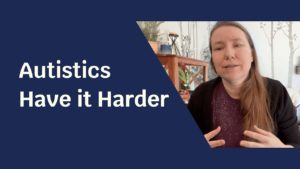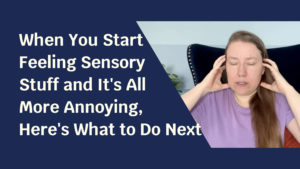Becoming whole
Since I started coaching and writing about autism online, I’ve deliberately avoided a particular topic. It’s something I assumed people wouldn’t want to hear, and I was afraid it would turn people away who would otherwise reach out to me. Even with current clients, I rarely broach it, and usually only if they bring it up first.
You see, in the past, I often blurted out uncomfortable truths or pressed my point past people’s ability to humor me—you can imagine how popular that made me—so I have a lot of emotional wounds around my “lack of tact,” as people politely put it while I was growing up.
Which is why I’ve kept my mouth shut about this sensitive topic. But my therapist keeps reminding me of how far I’ve come. Amazingly far. To talk to me now, many people have difficulty guessing that I was once one of those kids who would say awkward or direct things at the worst possible moment.
Despite old fears, my strong sense of integrity has been yelling inside me. I’m using ‘integrity’ here in the original Latin sense of integer, of whole, undivided. As I bring my life more and more into alignment with my deepest truth—as I become whole—I’ve noticed that in avoiding this issue, I am constantly fighting myself. I am divided. To put it in moralistic terms, I am lying.
And holding back this really big and important truth has been hurting me. It’s damming up my energy and turning it back in on itself like a log jam in a river. It needs to flow out into the world to do good.
I am fully aware that some people will not be able to hear this truth. Sadly, that will be the case whether I talk about this tender topic or whether I say the word ’autism.’ And good luck avoiding that on this website.
Then again, many people will feel the pull of integrity, of being whole, and will face this uncomfortable truth and do the work to heal it so they can build better lives for themselves and their families.
For those who are ready to take that scary and difficult and wonderful journey with me, this is for you.
So from now on, once in a while, I will write and talk about the T word. Because growing up autistic (or any kind of different) in an unaccepting world leaves it’s mark in how the brain develops.
Here’s the good news though. The brain is always developing. It is always changing. No matter how much T there is in your past, or your kid’s, it is possible to heal and to build an amazing life. An amazing autistic life. A life you love to live.
So what is this scary T word? Are you ready? It is trauma.
Don’t worry, I’m not going to get into all the kinds. Some people encounter sudden traumas, like rape or natural disasters. That’s not what I’m going to talk about. I’m also not going to get into long term abuse. These are important Ts, and there are people out there who have amazing resources to help you through them. Sometimes I might offer links to good ones.
What I want to talk about is the kind of long-term, subtle, complex trauma that comes from always feeling different and out of place and having your experience of the world misunderstood or ignored or invalidated for no more sinister reason than that you’re too little to explain what is going on inside and the people around you do not have a reference point to understand in which unique ways you need support.
Then by the time you’re old enough that you could explain, patterns and beliefs are so entrenched that it feels too weird or hard or scary to even try, so you don’t. So you feel more and more misunderstood and isolated. This can express itself in all sorts of ways, including anxiety, depression, addiction, over-achieving, people pleasing, excessive compliance, eating disorders, relationship issues, self-sabotage, lack of motivation, various mental illnesses, chronic unemployment, social isolation, and more.
Deep breath.
For parents especially, please hear me that this is not about bad parenting, or not connecting with your kid. You might actually have a great relationship with your kid, or your parents. I did, and do. In fact, though my relationship with my mom (and dad) was always good, it has grown much stronger and healthier since we started talking about this (my dad passed away before we could start this conversation).
So I’m not going to pull a guilt trip on anyone. In fact, I hope to do the exact opposite. I want to free everyone from guilt and shame and feeling like you don’t belong. To help people connect and understand each other better.
I’m not a therapist, and I’m not going to turn this into pseudo-therapy. Yet if my goal is truly to help people connect, I can’t avoid the ways that we have been disconnected in the past. We need to talk about that. So we can heal that. So we become able to move on. Stronger. Together.




